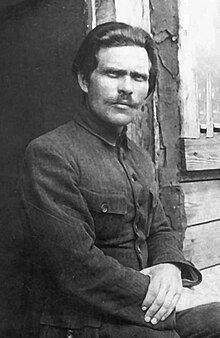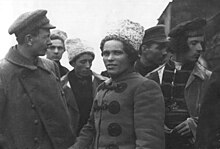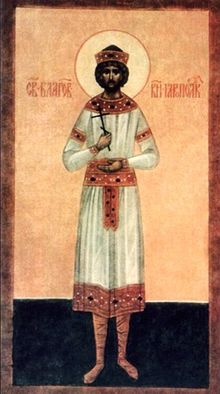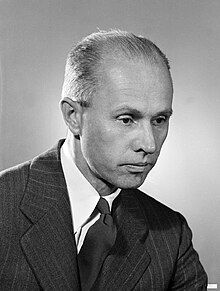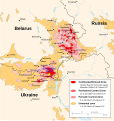
Summary
The Ukraine Portal - Портал України
Ukraine Україна (Ukrainian) | |
|---|---|
| ISO 3166 code | UA |
Ukraine is a country in Eastern Europe. It is the second-largest European country after Russia, which borders it to the east and northeast. It also borders Belarus to the north; Poland, Slovakia, and Hungary to the west; and Romania and Moldova to the southwest; with a coastline along the Black Sea and the Sea of Azov to the south and southeast. Kyiv is the nation's capital and largest city, followed by Kharkiv, Dnipro and Odesa. Ukraine's official language is Ukrainian; Russian is also widely spoken, especially in the east and south.
During the Middle Ages, Ukraine was the site of early Slavic expansion and the area later became a key centre of East Slavic culture under the state of Kievan Rus', which emerged in the 9th century. The state eventually disintegrated into rival regional powers and was ultimately destroyed by the Mongol invasions of the 13th century. The area was then contested, divided, and ruled by a variety of external powers for the next 600 years, including the Polish–Lithuanian Commonwealth, the Austrian Empire, the Ottoman Empire, and the Tsardom of Russia. The Cossack Hetmanate emerged in central Ukraine in the 17th century marked on maps as "Ukraine, land of the Cossacks", but was partitioned between Russia and Poland, and ultimately absorbed by the Russian Empire. Ukrainian nationalism developed and, following the Russian Revolution in 1917, the short-lived Ukrainian People's Republic was formed. The Bolsheviks consolidated control over much of the former empire and established the Ukrainian Soviet Socialist Republic, which became a constituent republic of the Soviet Union when it was formed in 1922. In the early 1930s, millions of Ukrainians died in the Holodomor, a human-made famine. The German occupation during World War II in Ukraine was devastating, with 7 million Ukrainian civilians killed, including most Ukrainian Jews.
Ukraine gained independence in 1991 as the Soviet Union dissolved, and declared itself neutral. A new constitution was adopted in 1996. A series of mass demonstrations, known as the Euromaidan, led to the establishment of a new government in 2014 after a revolution. Russia then unilaterally annexed Ukraine's Crimean Peninsula, and pro-Russian unrest culminated in a war in the Donbas between Russian-backed separatists and government forces in eastern Ukraine. Russia launched a full-scale invasion of Ukraine in 2022. Since the outbreak of war with Russia, Ukraine has continued to seek closer ties with the United States, European Union, and NATO.
Ukraine is a unitary state and its system of government is a semi-presidential republic. A developing country, it is the poorest country in Europe by nominal GDP per capita and corruption remains a significant issue. However, due to its extensive fertile land, pre-war Ukraine was one of the largest grain exporters in the world. It is a founding member of the United Nations, as well as a member of the Council of Europe, the World Trade Organization, and the OSCE. It is in the process of joining the European Union and has applied to join NATO. (Full article...)
In the news
- 18 April 2024 – Russian invasion of Ukraine
- Foreign involvement in the Russian invasion of Ukraine
- Germany arrests two German-Russian nationals for an alleged military sabotage plot on behalf of Russia to undermine military support for Ukraine. (Reuters)
- 17 April 2024 – Russian invasion of Ukraine
- April 2024 Chernihiv missile strike
- At least 18 people are killed and 60 others are injured in a Russian missile strike which damaged an eight-storey building in a densely populated area of Chernihiv. (BBC News) (Reuters)
- 16 April 2024 – Russian invasion of Ukraine
- Ukrainian President Volodymyr Zelenskyy signs a new army draft law. (Reuters)
- 13 April 2024 – Russian invasion of Ukraine
- The Russian Ministry of Defence claims that the village of Pervomaiske near Donetsk has been captured by Russian troops. (Barron's)
- 12 April 2024 – Russian invasion of Ukraine
- Russian strikes against Ukrainian infrastructure
- Russia launches drone strikes across Ukraine. Critical infrastructure is damaged in Kherson Oblast and a fire occurs at the Dnieper Hydroelectric Station in Zaporizhzhia causing around half a tonne of oil products to leak into the Dnieper river. (Reuters) (Ukrainska Pravda)
- 11 April 2024 – Russian invasion of Ukraine
- Mykolaiv strikes
- At least four people are killed and five others are injured in a Russian missile strike in Mykolaiv. (Reuters)
 Recognized content -
Recognized content - 
Featured pictures
Did you know (auto-generated)

- ... that Ukrainian parties obtained only a fifth of the votes in the 1917 Kiev City Duma election?
- ... that in the history of opera in Ukraine, Mykola Lysenko's historical Taras Bulba was the first grand opera, but not performed during his lifetime because he refused a performance in Russian?
- ... that the Dvorichna settlement hromada has remained divided between Russia and Ukraine since the 2022 Kharkiv counteroffensive?
- ... that Ukrainian designer Anna October showed her collection during Paris Fashion Week after escaping the 2022 Russian invasion of Ukraine?
- ... that the 1885 spiritual anthem Prayer for Ukraine was performed by a choir from New York on Saturday Night Live?
- ... that the historian and political journalist Lancelot Lawton addressed a House of Commons committee in London in 1935, beginning: "The chief problem in Europe to-day is the Ukrainian problem"?
More did you know -
- ... that the Privat Group is one of the few Ukrainian companies that own industries in the United States?
- ... that among many historic landmarks at the Andrew's Descent in Kyiv, there is a medieval Gothic style castle that locals call the "Castle of Richard the Lion Heart" due to the legend the 12th century King of England had visited the building?
- ... that Vasyl Avramenko is often referred as "The father of the Ukrainian dance"?
- ... that the Khreschatyk is the main street of Ukrainian capital Kyiv on which Orange Revolution and other historical events mainly took place?
- ... that the neo-classical Verkhovna Rada building in Kyiv features a hundred-tonne glass dome over the chamber where the Verkhovna Rada of Ukraine convenes to enact legislation?
- ... that the Kryvbas economic region in Ukraine is one of the largest iron ore and steel industry centers in Europe?
Selected article -

Ukraine emerged as the concept of a nation, and the Ukrainians as a nationality, with the Ukrainian National Revival which began in the late 18th and early 19th century. The first wave of national revival is traditionally connected with the publication of the first part of "Eneyida" by Ivan Kotlyarevsky (1798). In 1846, in Moscow the "Istoriya Rusov ili Maloi Rossii" (History of Ruthenians or Little Russia) was published. During the Spring of Nations, in 1848 in Lemberg (Lviv) the Supreme Ruthenian Council was created which declared that Galician Ruthenians were part of the bigger Ukrainian nation. The council adopted the yellow and blue flag, the current Ukrainian flag.
Ukraine first declared its independence with the invasion of Bolsheviks in late 1917. Following the conclusion of World War I and with the Peace of Riga, Ukraine was partitioned once again between Poland and the Bolshevik Russia. The Bolshevik-occupied portion of the territory became the Ukrainian Soviet Socialist Republic, with some boundary adjustments. (Full article...)In the news
- 18 April 2024 – Russian invasion of Ukraine
- Foreign involvement in the Russian invasion of Ukraine
- Germany arrests two German-Russian nationals for an alleged military sabotage plot on behalf of Russia to undermine military support for Ukraine. (Reuters)
- 17 April 2024 – Russian invasion of Ukraine
- April 2024 Chernihiv missile strike
- At least 18 people are killed and 60 others are injured in a Russian missile strike which damaged an eight-storey building in a densely populated area of Chernihiv. (BBC News) (Reuters)
- 16 April 2024 – Russian invasion of Ukraine
- Ukrainian President Volodymyr Zelenskyy signs a new army draft law. (Reuters)
- 13 April 2024 – Russian invasion of Ukraine
- The Russian Ministry of Defence claims that the village of Pervomaiske near Donetsk has been captured by Russian troops. (Barron's)
- 12 April 2024 – Russian invasion of Ukraine
- Russian strikes against Ukrainian infrastructure
- Russia launches drone strikes across Ukraine. Critical infrastructure is damaged in Kherson Oblast and a fire occurs at the Dnieper Hydroelectric Station in Zaporizhzhia causing around half a tonne of oil products to leak into the Dnieper river. (Reuters) (Ukrainska Pravda)
- 11 April 2024 – Russian invasion of Ukraine
- Mykolaiv strikes
- At least four people are killed and five others are injured in a Russian missile strike in Mykolaiv. (Reuters)
Selected anniversaries for April

- April 16, 2000 — Ukraine's national referendum takes place on the issue of reformation the governing system of Ukraine.
- April 22, 2006 — Two homemade bombs exploded in different supermarkets in the Ukrainian city of Kharkiv.
- April 26, 1986 — Reactor No. 4 of the Chernobyl Nuclear Power Plant exploded at 01:23 A.M.
- April 29, 1918 — Constitution of the Ukrainian People's Republic, a constitutional document, was approved by the Central Rada, but never announced.
- April 29, 1918 — The Holiday of Ukrainian Sea. On this day the main parts of Black Sea fleet in Sevastopol hoisted ukrainian flags.
Photo gallery
Related portals
Religions in Ukraine
Post Soviet states
Other countries








